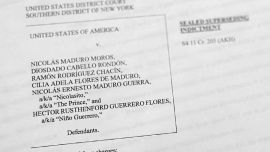MEMORY DAY
Marches marking the 47th anniversary of the 1976 military coup in the public holiday formally designated National Day of Memory for Truth and Justice were the culmination of a “Week of Memory” organised by the Human Rights Secretariat with events throughout with the weeklong III World Forum on Human Rights the highlight. But memories of past horrors had to compete with current issues – thus the march of La Cámpora militant grouping from the Memory Museum (formerly the Navy Mechanics School concentration camp) to Plaza de Mayo was under the banner “30,000 reasons to march. Democracy without mafias” with the first half referring to 30,000 going missing under the 1976-1983 dictatorship and the second half a protest against alleged lawfare victimising Vice-President Cristina Fernández de Kirchner.
STATE SHEDS DOLLAR BONDS
Economy Minister Sergio Massa announced on Monday that state bodies would be obliged to “pesofy” their dollar bonds, thus releasing more greenbacks for the market and reducing dependence on scant Central Bank reserves. According to the plan, state entities would sell their dollar bonds on the market, converting the peso proceeds into Treasury bond debt. The manoeuvre is aimed in particular at feeding the CCL (contado con liquidación) and MEP (or dólar Bolsa) parallel but legal exchange rates. “The purchase of the global bonds of public entities will permit the public debt under foreign law to be lowered to the tune of some US$4 billion initially,” tweeted Deputy Economy Minister Gabriel Rubinstein. On Wednesday morning Massa met up in the Economy Ministry with bankers, financial consultants and Argentine investment fund managers to give them the details of his decision. Most participants expressed a positive opinion, at least in public, but prívate analysts were more sceptical while Argentine sovereign bonds plunged in the first half of the week. One economic analyst called the move a time bomb for the next government by pulling dollar bonds out of public entities like the pension system in exchange for unpayable peso bonds which will require rescheduling. At the start of the week Central Bank reserves received a booster of US$680.4 million in the form of loans of US$285.4 million and US$395 million from the CAF (Corporación Andina de Fomento) and BCIE (Banco Centroamericano de Integración Económica) regional banks respectively with further financing of US$235 million pledged by the BID Inter-American Development Bank last weekend while China gave permission to actívate US$1 billion dollars of its currency swap with a further billion due next month. Up to this week the Central Bank had been obliged to sell US$2.222 billion of its reserves so far this year. Finally, the International Monetary Fund (IMF) agreed to postpone a payment of US$2.717 billion due last week until March 31 in the hope that formal approval of fiscal performance in the last quarter of 2022 releases a remittance of US$5.3 billion from the creditor.
EDESUR TRUSTEESHIP
At the start of a week of cooler temperatures, the government announced the state intervention of the administration of Edesur power utility for the next 180 days with Avellaneda Mayor Jorge Ferraresi (Housing minister until last October) named as trustee. As a further state response to a fortnight of power cuts hitting thousands of citizens amid record-breaking torrid heat, Massa also announced that a fine of 2.7 billion pesos would be slapped on the utility with the aim of compensating those denied service. Ferraresi’s brief will be to monitor the completion of public works and improvements in the service while the share package and the lease contract of Edesur will remain intact. On Wednesday the government asked Federal Judge Julián Ercolini to ban the Edesur executives from leaving the country.
AT LONG LAST BIDEN
President Alberto Fernández is pencilled in to meet his United States counterpart Joe Biden in the White House next Wednesday, after two postponements last year, although final confirmation is still pending. President Fernández is expected to make a literally flying visit, heading home as soon as his meeting with Biden is concluded.
SONG REMAINS THE SAME
Even if President Alberto Fernández nominally heads the Grupo Puebla, it was his Vice-President Cristina Fernández de Kirchner who was the centre of attention at its Summit and entrusted with its Tuesday closure. Complaining repeatedly of “lawfare,” she asserted: “If they send me to prison, I don’t care, what I care about is reconstructing democracy and returning to the country we once had” at a conclave aimed at backing her against “judicial persecution.” Her audience included such ex-presidents as José Mujica (Uruguay), Rafael Correa (Ecuador) and Ernesto Samper (Colombia) as well as Spanish ex-premier José Luis Rodríguez Zapatero but also militants chanting: “Cristina presidenta.” President Fernández, who was at pains to avoid overlapping with his vice-president, was limited to announcing the return of Argentina to the UNASUR (Unión de Naciones Suramericanas) regional bloc, saying: “We are all in the same boat.” The Grupo Puebla unites 18 countries but its progressive members are mostly ex-presidents.
D’ALESSANDRO RESIGNS
City Security Minister Marcelo D’Alessandro, on an extended leave of absence since his participation in the Lago Escondido huddle with judges and media executives came to light in December, confirmed his resignation in midweek. He will be replaced by Eugenio Burzaco, who seconded current PRO chair Patricia Bullrich when she headed the national Security Ministry between 2015 and 2019. Mayor Horacio Rodríguez Larreta, who named D’Alessandro early in his mayoralty in 2016, ratified his belief in his outgoing minister’s innocence of any anti-government conspiracy.
CORDOBA TO VOTE IN JUNE
Outgoing Córdoba Peronist Governor Juan Schiaretti on Monday set the date for provincial elections as June 25, thus joining the vast majority of provinces separating their voting from the October 22 general elections. On either side of the announcement there were at least two significant political developments in the province – last Sunday the Juntos por el Cambio opposition retained La Falda town hall, increasing their vote to 71 percent from the 49 percent of 2019 in a low turnout, while within hours of Schiaretti’s announcement the opposition coalition reached agreement on their gubernatorial candidate, opting for PRO Senator Luis Juez over Radical deputy Rodrigo de Loredo after the latter stepped down to ensure a united front. It would be quicker to list the provinces still scheduled to vote in October than those advancing their own voting – beyond Buenos Aires City and Province, they are Catamarca, Chaco, Chubut, Formosa, La Rioja and Santa Cruz.
WASHINGTON RAPS RIGHTS RECORD
The US State Department’s annual report covering human rights worldwide in 2022 included some scathing references when it came to Argentina, denouncing “numerous cases of corruption,” an “inefficient and politicised” judicial system, prison overcrowding (especially in Buenos Aires Province), police brutality (including “ilegal executions”) and mistreatment of indigenous communities, singling out the conflict with the Mapuches, while hailing the trial of Vice-President Cristina Fernández de Kirchner although “impunity continues being an important problem.” However the report acknowledged that the government “in general” respected the freedom of expression. Many of these points had already been made in the reports of previous years.
LIFE SENTENCE
Matías Farías, 48, was sentenced to life imprisonment in Mar del Plata on Thursday for the rape and femicide of 16-year-old Lucia Pérez in the Atlantic resort in October, 2016, a murder that helped spark the Ni Una Menos movement.
JUJUY QUAKE
The province of Jujuy was rocked on Wednesday by a massive earthquake measuring 6.4 degrees on the Richter Scale which crossed borders into both Chile and Bolivia. It was preceded an hour beforehand by a tremor measuring 5.2 degrees. Since it occurred in the underpopulated department of Susques, no injuries were immediately reported.
CHAMPS IN CHAMPAGNE MOOD
The World Cup champions returned home on Monday to begin a week of celebrations of their triumph culminating in next Tuesday’s match against Curaçao although both that game and the other friendly against Panama last Thursday were little more than footnotes to the general festive mood in most minds with the Panama match almost an interval to the three musical shows in Monumental stadium. Messi had an early experience of the euphoria when dining with his family in Don Julio parrilla in Palermo on Monday evening when he was mobbed by fans gathering outside to cheer him.
HERALDING OF A NEW ERA
Confirmation arrived Thursday of the official relaunch of the Buenos Aires Herald after almost five years of non-activity. The storied newspaper, fond to so many of our hearts here at the Times, is now returning as a website under the leadership of economic journalist Estefania Pozzo, who often appears on the C5N TV news channel. To respond to some of the questions we’ve received over the past few months, our staff are not involved in the project. The Herald was shuttered in 2017 by its owners Grupo Indalo, who remain in charge of the brand and the new project. The newspaper’s controversial closure was overshadowed by legal issues, with its former staff forced to embark upon legal action to receive their redundancy pay and the outlet’s entire news archive taken offline.





















Comments